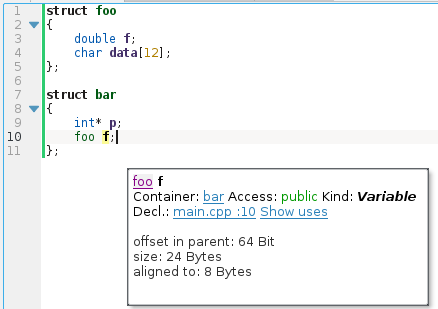Hello all!
I’m happy to (finally!) announce the release of the latest stable versions of Massif-Visualizer and KGraphViewer:
Both versions come filled with bug fixes, cleanups and performance improvements. Everyone is urged to update!
Cheers and many thanks to all contributors.
continue reading...
Hello all,

displaying size meta data of classes and members in KDevelop thanks to Clang
I’m very glad to finally announce the first beta of KDevelop 5.0.0, based on Qt 5, KF 5 and Clang: https://www.kdevelop.org/news/first-beta-release-kdevelop-500-available
Like I’ve said previously, I’m very thankful of the tons of contributors that made this step possible. From the early testers, over the many new KDevelop contributors who helped a lot in porting our code base to Qt 5 and KF5, to the people that worked on improving kdev-clang and all the other areas. It’s a great feeling to finally release this beast. A year ago, just after we started in this process, I still wasn’t too sure we can pull it all off. Now, look where we are :) “Just” a few more weeks of polishing and I’m positively sure KDevelop 5.0.0 will be a really good milestone.
That said, I also want to express my thanks towards the KDE e.V. which graciously sponsored our recent KDevelop/Kate sprint in Berlin. We rented a flat for the 8 hackers that visited Berlin and had a productive five days directly after the Qt World Summit. Personally, I worked on kdev-clang and polished it a bit more in the preparation of the first beta release. One handy feature I added is the display of size information about classes and member variables, displayed in the image to the right.
continue reading...
Hello all!
I have the pleasure to attend Akademy this year again. From my past experience, I’m really looking forward to have a good time again. Lots of hacking, meeting known and unknown faces, drinking beer and socializing ahead! I also love that it’s in a (to me) new country again, and wonder what I will see of the Czech Republic and Brno!
This year, the conference schedule is a bit different from the past years. Not only do we have the usual two days packed with interesting talks and keynotes. No - this year there will also be workshops on the third day! These are more in-depth talks which hopefully teach the audience some new skills, be it QML, mobile development, testing, or … profiling :) Your’s truly has the honor to hold a one-hour Profiling 101 workshop.
continue reading...
Hello all!
it’s my pleasure to announce the immediate availability of KDevelop 4.7.1. This release contains many improvements and bug fixes - everyone is urged to upgrade. Distributions should already provide updated packages, otherwise you can download via:
Thanks to all contributors, users and bug reporters for making this release possible!
continue reading...
Hey all,
last week, I handed in my Master’s thesis. I was studying Physics for about 7.5 years now. I started using KDE 3.5.x while still in school and in my first student job as a web developer. At university, I taught myself C++ while working as a sysadmin at the faculty, in order to contribute to Kate, Quanta and KDevelop. I quickly discovered that Physics wasn’t so much my thing but the German education system doesn’t make it easy to switch fields. Thus, I endured and continued. And I kept coding though, mostly in my spare time, but also while working part-time for KDAB. Now, all these years later, I’m one of the official maintainers of KDevelop, and also contribute to KF5, esp. KTextEditor regularly. I created tools such as Massif-Visualizer and heaptrack. I became a Qt approver and maintainer of the Qt WebChannel module. And, starting from May this year, I’ll finally be working full-time for KDAB. Oh, how things have changed! Just compare Plasma 5.2 today to the KDE 4.0 alpha 1 or whatever it was that I tried in 2007 - a difference of night and day!
continue reading...
Hello all,
I’m happy to be back so soon with a status update on heaptrack: It is now possible to attach to an already running process!
Thanks to the great help from Celelibi on StackOverflow, I managed to achieve this important goal. Once you know what to do, it is actually extremely simple to patch a running process. I use GDB to attach to the process, then call dlopen to load a special heaptrack library for runtime-injection. Then I call an initialization function which takes the desired output file as a parameter, and then detach GDB. To actually overwrite malloc & friends, one can leverage dl_iterate_phdr and the public ELF API on Linux systems to find dynamic sections that reference one of our target symbols in their global offset table (GOT). This can then be rewritten to point to our custom hooks. Some refactoring later, which stabilized the shutdown sequence to allows multiple heaptrack attach/detach sequences, we can now do this:
heaptrack -p $(pidof <yourapp>)
# wait
^C
heaptrack_print heaptrack.<yourapp>.$$.gz | less
continue reading...
Hello everyone,
with a tingly feeling in my belly, I’m happy to announce heaptrack, a heap memory profiler for Linux. Over the last couple of months I’ve worked on this new tool in my free time. What started as a “what if” experiment quickly became such a promising tool that I couldn’t stop working on it, at the cost of neglecting my physics masters thesis (who needs that anyways, eh?). In the following, I’ll show you how to use this tool, and why you should start using it.
A faster Massif?
Massif, from the Valgrind suite, is an invaluable tool for me. Paired with my Massif-Visualizer, I found and fixed many problems in applications that lead to excessive heap memory consumption. There are some issues with Massif though:
- It is relatively slow. Especially on multi-threaded applications the overhead is large, as Valgrind serializes the code execution. In the end, this sometimes prevents one from using Massif altogether, as running an application for hours is unpractical. I know that we at KDAB sometimes had to resort to over-night or even over-weekend Massif sessions in the hope to analyze elusive heap memory consumption issues.
- It is not easy to use. Sure, running
valgrind --tool=massif <your app> is simple, but most of the time, the resulting data will be too coarse. Frequently, one has to play around to find the correct parameters to pass to --depth, --detailed-freq and --max-snapshots. Paired with the above, this is cumbersome. Oh and don’t forget to pass --smc-check=all-non-file when your application uses a JIT engine internally. Forget that, and your Massif session will abort eventually. - The output is only written at the end. When you try to debug an issue that takes a long time to show up, it would be useful to regularly inspect the current Massif data. Maybe the problem is already apparent and we can stop the debug session? With Massif, this is not an option, as it only writes the output data at the end, when the debugee stops.
continue reading...
Hello all!
It’s my pleasure to finally announce the availability of KDevelop 4.7.0:
https://www.kdevelop.org/news/kdevelop-470-released
This is a special release, as it marks the end of the KDE 4 era for us in terms of feature development. We will continue to support this release in the long-term with bug fixes though. New things and fundamental changes will only happen in the frameworkified master branches from now an.
Many thanks to all contributors!
Cheers
continue reading...
Yesterday my Profiling 101 workshop took place at this years Akademy in Brno. The room was packed and I got good feedback, so I hope you all learned something new :)
During my workshop, I showed you how to improve the performance of a word-count application which also creates a word histogram and finds the longest word of a file. I tried to put as many performance bottlenecks as possible into the original code base, which you can find here:
git clone git@git.kde.org:scratch/mwolff/akademy-2014.git
Instead of uploading my useless slides full of meme images, instead I’m now pushing my optimized code branch. I urge everyone to review the commits I did and read the individual commit messages ( Note : read this log from bottom to top). There are many useful tips and tricks in there. I furthermore plan to create a techbase article with the most important notes on how to use profilers for a given job. I’ll write another blog post once I’m done with that.
continue reading...
Hello all!
Kevin just announced it on the mailing list, the CI is still shaking it’s head, and we are all very curious about the coming weeks: KDevelop’s master branches are now depending on KF5!
For more information, see: https://www.kdevelop.org/frameworks/kdevelop-master-now-depends-kde-fram…
Cheers, happy hacking and hope to see some more patches :)
continue reading...

